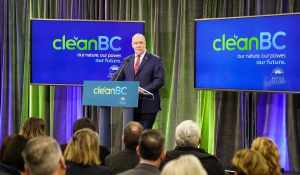Clean Energy Canada | As the carbon tax debate heats up in Ottawa, Canada should look to B.C.
January 31, 2019

As MPs descend on Ottawa for the last parliamentary session before this October’s election, it’s clear that battle lines are being drawn on climate change and how — and perhaps even whether — to effectively tackle it.
Indeed, if this year’s federal election were a game of Risk, one can imagine how that board might look: cannons and cavalry covering Ontario and Quebec, blue infantry pieces shoulder-to-shoulder in the Prairies.
As for B.C.? It doesn’t have Ontario or Quebec’s size, nor is it the power centre for a single party like Alberta and Saskatchewan. It’s a province where Liberals, Conservatives, NDPers and Greens get elected. And it’s the province that incubated many of Canada’s future-shaping climate policies — including a number of new ones unveiled late last year, such as a critical policy to help electric vehicle supply keep up with demand.
But Canadians aren’t talking about progress being made on the West Coast. Canadians are talking about carbon pricing, as the federal government now moves to ensure that every province and territory prices climate-change-causing pollution. Enter a number of party leaders who are putting politics before pragmatism. Ontario Premier Doug Ford even went so far as to pick fights with, in his words, the “elite economists” and their “academic theories.”
But as one factually dubious claim after the other continues to make headlines, an entire decade of real-world evidence from B.C. is sitting on the shelf collecting dust. And so it is at partisan times like these that we must remind ourselves that when it comes to climate policy — like climate science — we can choose what we listen to and broadcast: evidence and expertise or political sound bites.
Because there is independent research, and plenty of it. There’s the research that found that B.C.’s revenue-neutral carbon tax has cut emissions by 5 to 15 per cent from what they would be otherwise. There’s also the research that says B.C.’s tax demonstrably reduced gasoline demand as well as natural gas use — and actually increased employment.
That last one shouldn’t surprise you. In the five years leading up to 2016, B.C.’s cleantech sector grew significantly to include nearly 300 companies. Just this week, 12 Canadian companies were named to the Global Cleantech 100 list — half of those were from B.C.
Beyond the research, we also need a common understanding of how to evaluate whether carbon pricing is working. For example, arguing that carbon pricing doesn’t work because overall emissions can still go up — as the policy’s vocal critics have been doing a lot of lately — is like saying that exercise doesn’t work because it’s possible to gain weight at the same time. Obviously, there are other factors: how much you’re exercising, your diet, your age. But exercise still works — and is indeed very effective.
UBC economist Kevin Milligan put it another way in a recent tweet: even in years when emissions have risen, “there is overwhelming evidence that carbon pricing has succeeded in bending the curve downward.”
Economies are complex: industries shift, consumer patterns change, populations grow, new policies come into effect, and carbon pricing is one piece of that puzzle.
But ultimately, it is a critically important piece, which is why — in a study from the Institute for Policy Integrity — 81 per cent of economists said that pricing carbon is the most efficient way to cut pollution.
Evidence and expertise are essential —
not optional — for good policy. Discarding them in favour of easy
politics is nothing more than a failure of leadership.
It was a centre-right Liberal government that introduced B.C.’s carbon tax. Back then the NDP campaigned to “axe the tax.” Today, it’s an NDP government — supported by the Greens — leading the way, not only keeping but increasing the tax. This isn’t the legacy of one party. It’s the legacy of B.C.’s political leaders putting evidence and expertise before politics.
The rest of Canada — and politicians in Ottawa — can learn from that legacy. And the peer-reviewed research that comes with it.
This article was co-authored by Dan Woynillowicz, policy director at Clean Energy Canada, and originally appeared in iPolitics.